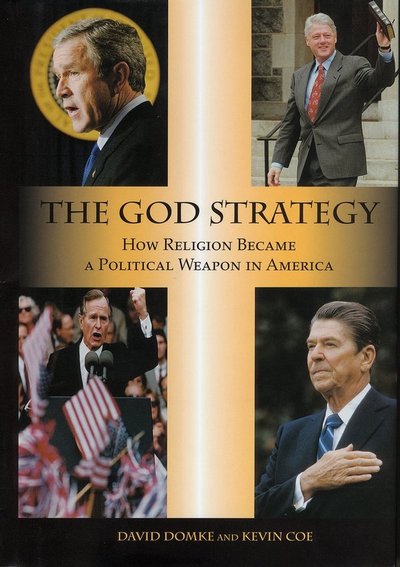December 4, 2007
Religious politics now pervasive, says new book, ‘The God Strategy’
With Republican presidential candidate Mitt Romney scheduled to address the nation about his Mormon beliefs this Thursday, Democratic and Republican debates in Iowa next week, the Iowa caucus only a month away and seemingly endless political discussion fueled by religion, a new book co-authored by a University of Washington professor explains how politicians are using God talk to garner votes.
David Domke, a professor of communication at the UW and a former journalist, and Kevin Coe, a doctoral candidate at the University of Illinois, have written “The God Strategy: How Religion Became a Political Weapon in America” (Oxford University Press, $30).
“For presidential candidates today, having faith isn’t enough; it must be displayed, carefully and publicly. It’s a dangerous dynamic, one that runs counter to the Founders’ vision for America,” Domke says. “Unfortunately, as the 2008 campaign shows us, there’s no sign it’s going away. It’s crucial we as citizens understand these dynamics.”
Domke and Coe analyzed more than 15,000 messages by political leaders from Franklin Roosevelt in 1932 —the beginning of the modern presidency — through six years of George W. Bush’s administration. This examination revealed a striking increase in religious signals beginning in 1980. In party platforms, presidential addresses to the nation, White House proclamations, speeches before faith groups and even celebrations of Christmas, presidential candidates from both parties now engage in religious politics, most such displays carefully scripted, timed and delivered, the researchers say.
Behold, the God strategy — and this month, it’s playing prominently in Iowa, not to mention several other states. On Dec. 12 and 13, Republican and Democratic presidential candidates will engage in televised debates, only weeks away from the Jan. 3 state caucus. It was at the 2000 GOP debate in Iowa that George W. Bush named Jesus as his favorite philosopher. This year, Republican candidates in Iowa are chasing former Arkansas governor and Southern Baptist minister Mike Huckabee, whose first ad in the state talks about the central role of faith in his life.
From 1952, when presidential convention acceptance addresses were first televised live, through 1976, Democratic and Republican nominees invoked God on average 2.4 times per address and included common faith terms — pray, proverb, sacred, sin — 11.8 times per address, write Coe and Domke.
Since 1980, however, the GOP nominee has invoked God an average of 5.2 times per address — more than double the previous level — and included 19.5 faith terms, a 65 percent increase. Among Democrats, Walter Mondale in 1984 and Michael Dukakis in 1988 made only a handful of religious references, but beginning with Bill Clinton in 1992, Democratic nominees have averaged 4.3 invocations of God and 16.5 faith terms per address — increases of 77 percent and 40 percent over pre-1980 levels. Presidential candidates are now afraid of being seen as apostates, Coe and Domke say.
Hence, Romney’s address this Thursday evening, scheduled to be delivered at the George H.W. Bush Presidential Library in College Station, Texas.
Pilgrimages are another aspect of the God strategy. For example, last week Democratic front-runner Hillary Clinton spoke to more than 2,000 evangelical voters, many of them ministers, at a summit on AIDS held by pastor and best-selling author Rick Warren at his church in southern California. She delivered an emotional address, invoking Scripture and sharing her faith.
From Roosevelt through Carter, presidents averaged 5.3 public remarks before overtly religious organizations in a four-year term. Beginning with Reagan, through six years of George W. Bush’s presidency, this average more than tripled to 16.6 per term. Since 1981, GOP presidents have spoken 13 times to the National Association of Evangelicals or the National Religious Broadcasters Association, four times to the Knights of Columbus and four times to the Southern Baptist Convention.
Clinton never spoke to these conservative organizations, but he did go to church — again and again. From Roosevelt through Carter, presidents delivered public remarks in churches an average of twice per four-year term. In contrast, Clinton spoke in churches 28 times during two terms in the White House — 10 more than Reagan, Bush Sr., and Bush Jr. (through six years) combined. Clinton spoke in worship services, at funerals and often before African American congregations. His lower-profile approach worked perfectly in a political party often divided over matters of faith, the researchers say.
###
A photo of the book cover is available upon request. For a copy of the book, contact Darren Shannon at Oxford University Press (Darren.shannon@oup.com. For more information, contact Domke at (206) 795-8802 or domke@u.washington.edu .

